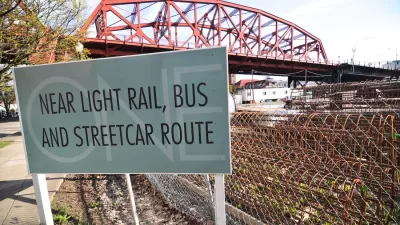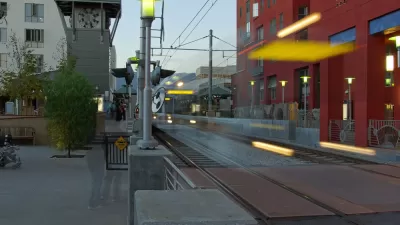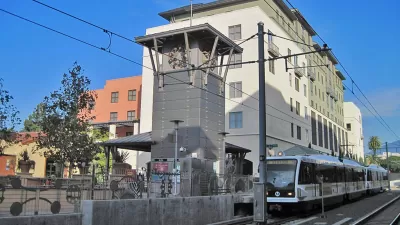This piece from the Vancouver Sun advocates using land value capture taxes to fund transit and related improvements. Such a tax would target speculation, the author writes, rather than productive activity.

In the wake of a local vote against regressive tax hikes to fund transit, Paul Finch considers another way. "Land Value Capture, also known as an Area Benefiting Tax. To translate in plain terms: pay for transit improvements by taxing some of the property appreciation that those improvements produce."
In essence, land value capture would cut into the profits of developers speculating on transit-oriented gentrification. "Public infrastructure causes windfall gains for nearby property owners and developers. We could finance construction through government bonds, then repay those bonds over time with an incrementally higher property tax on nearby developable sites."
Finch argues that taxing higher land values doesn't significantly harm the economy. "Such a scheme has no 'dead weight loss' — that is, unlike income and sales taxes, it doesn't stifle the economy and taxes speculation rather than productive activity."
Transit's critics often deride its tendency to operate in the red, at least as far as fare revenues go. Land value capture has the potential to make transit's beneficiaries pay for what they're getting.
FULL STORY: Opinion: Fund transit by taxing land speculators

Planetizen Federal Action Tracker
A weekly monitor of how Trump’s orders and actions are impacting planners and planning in America.

Restaurant Patios Were a Pandemic Win — Why Were They so Hard to Keep?
Social distancing requirements and changes in travel patterns prompted cities to pilot new uses for street and sidewalk space. Then it got complicated.

Map: Where Senate Republicans Want to Sell Your Public Lands
For public land advocates, the Senate Republicans’ proposal to sell millions of acres of public land in the West is “the biggest fight of their careers.”

Orange County, Florida Adopts Largest US “Sprawl Repair” Code
The ‘Orange Code’ seeks to rectify decades of sprawl-inducing, car-oriented development.

Maui's Vacation Rental Debate Turns Ugly
Verbal attacks, misinformation campaigns and fistfights plague a high-stakes debate to convert thousands of vacation rentals into long-term housing.

San Francisco Suspends Traffic Calming Amidst Record Deaths
Citing “a challenging fiscal landscape,” the city will cease the program on the heels of 42 traffic deaths, including 24 pedestrians.
Urban Design for Planners 1: Software Tools
This six-course series explores essential urban design concepts using open source software and equips planners with the tools they need to participate fully in the urban design process.
Planning for Universal Design
Learn the tools for implementing Universal Design in planning regulations.
Heyer Gruel & Associates PA
JM Goldson LLC
Custer County Colorado
City of Camden Redevelopment Agency
City of Astoria
Transportation Research & Education Center (TREC) at Portland State University
Camden Redevelopment Agency
City of Claremont
Municipality of Princeton (NJ)





























